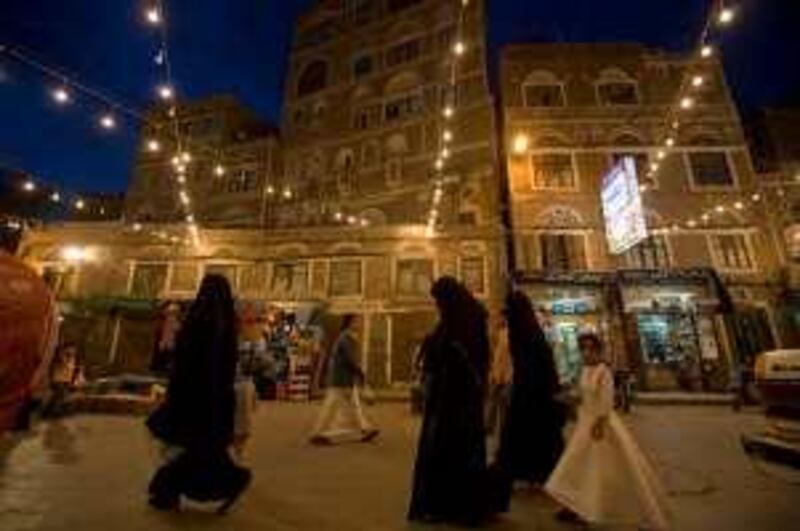Yemen is counting on its wealth of historical sites and attractive deals for foreign investors to kick-start its fledgling tourism sector. "The new plan [is to] basically help us repair the negative image of the country [and] to attract investments from the GCC region and other countries around the world," said Omar Awad, the Yemeni deputy minister of tourism, adding that the nation hoped to attract up to US$5 billion (Dh18.36bn) from investors under the plan.
Tourism revenue in Yemen totalled about $500 million last year, when 500,000 tourists visited the country. The nation's reputation as a dangerous destination has sparked government travel warnings, including from the UK, the US, Italy, Germany, France, Australia and Canada, most of which advise against non-essential travel there. In August last year, however, Britain's foreign and commonwealth office (FCO) downgraded its blanket warning on travel to Yemen to just five regions.
"We advise against all but essential travel to the governorates of Sa'dah, Ma'rib, al Jawf, Shabwah and Hadhramaut due to the threat of terrorism and tribal violence," the FCO said on its website. "We also advise against all but essential travel to Sana'a." Andreas Brauer, a senior consultant at PKF, an international hotel and property consultancy firm, said Yemen's biggest challenge in attracting investors would be to counter negative perceptions in the market.
"Once this negative image is corrected, Yemen's tourism will pick up, just like Oman, which has similar natural resources as Yemen." Mr Brauer said the Yemeni government must also work to improve the country's infrastructure, which would provide a springboard for investors to start projects. "But, again, the most important element to tourism is security. Once that is dealt with, everyone will want to go and see the wide pool of rich cultural offerings that the country has. And the kidnapping experience is not part of what is known as adventure tourism."
The Yemen Soldiers Brigade, a group linked with al Qa'eda, claimed responsibility for a suicide car bomb attack in July last year that killed two people and injured 18 at a police complex in Hadhramaut province, in the nation's eastern regions. The group had earlier said it was behind other attacks, including the killing of two Belgian tourists in Hadhramaut in January last year. Ahmed al Bail, the executive director of the Yemeni tourism promotion board, said last year that nearly 1 per cent of tourists visiting Yemen were kidnapped.
"The situation is improving and we need to tell people around the world that Yemen is safe and there are a lot of opportunities for them to benefit from," said Mr Awad. Yemen is hoping to attract 1.5 million tourists by 2015 as part of its plan, and Mr Awad said the government was willing to be "very flexible" with investors to achieve this target. "The price of land can be negotiated and if the company wants to partner with the government... arrangements can be made possible."
Yemen has one of the lowest levels of tourism revenue in the Middle East and North Africa. However, a report released in June last year by Fast Future, a UK-based tourism consultancy, said if the nation's infrastructure was improved it could generate US$44bn from tourism by 2020. "Even with the economic crisis, I believe that having a clean slate to start off from and invest in a country with so much potential is something every investor is looking for," said Mr Awad, adding that the tourism push would target emerging markets such as China and other East Asia countries.
"These are the upcoming markets and we really want to tap into and benefit from their growth." Adnan Aridi, the general manager of Alpha Tours, one of the largest tour operators in the Emirates, said demand for Yemen from within the GCC region was low. "People in this part of the world would almost never consider going to Yemen because the country still does not have activities such as shopping that people are interested in," he said.
Areas that Yemen sees as strengths include cultural, adventure and ecotourism adventures. Its capital, Sana'a, is a Unesco World Heritage site thanks to its centuries-old buildings and a history that dates back more than 2,500 years. Yemen has the largest number of UN cultural and heritage sites in the Arabian Peninsula. In the past year, the tourism ministry has been working to position the country as a mass-visitor destination by developing hotels for all budgets, from the Sheraton, which averages $1,000 a night, to two-star hotels that charge about $20 a night.
"We want the destination to be affordable to everyone and that way we could attract more people to visit Yemen during this economic crisis," said Mr Awad. abakr@thenational.ae






